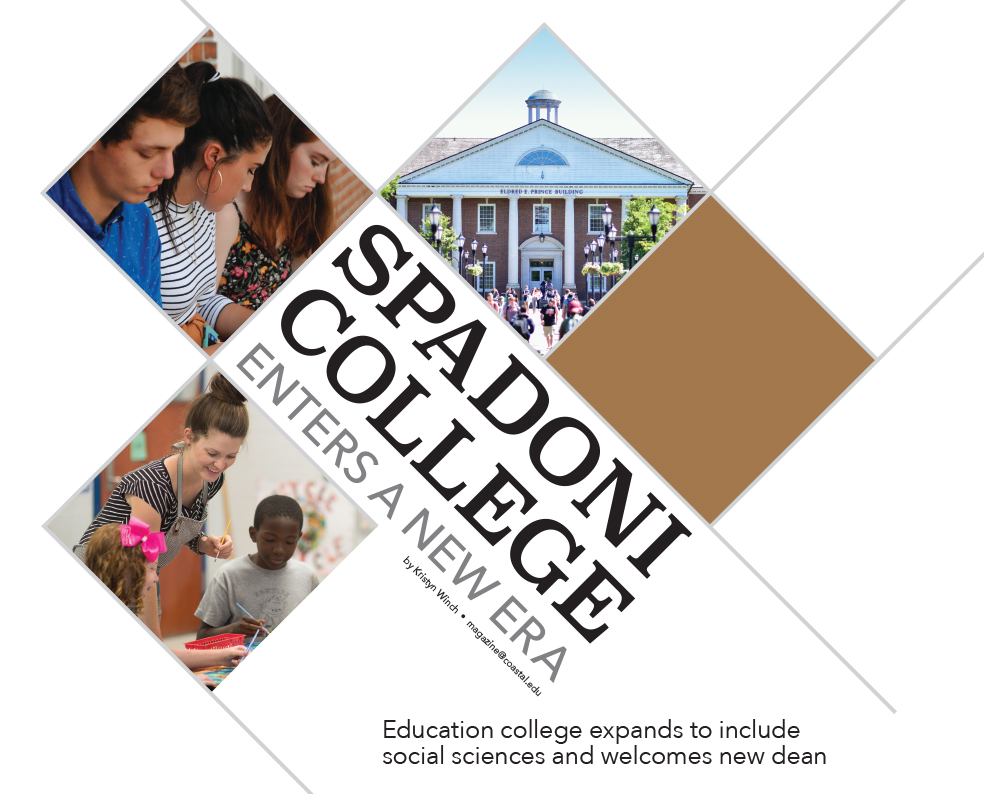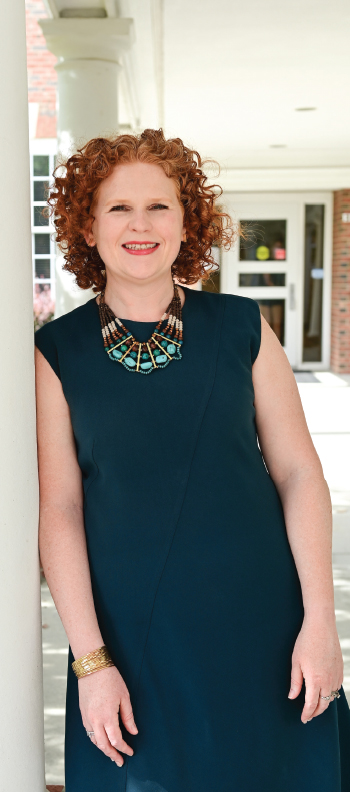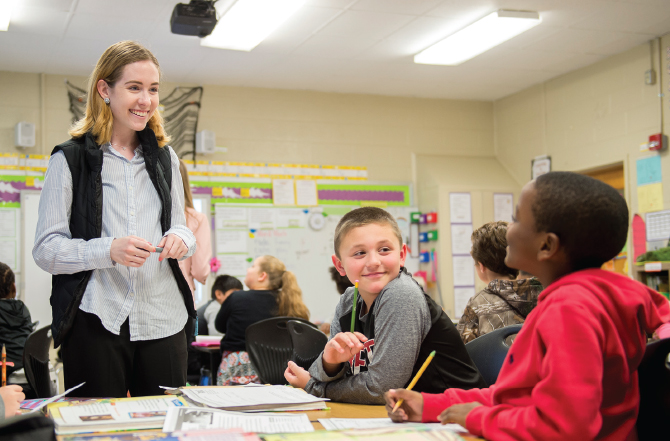
The 2021-2022 academic year represents several major changes for one of the six academic colleges at Coastal Carolina University. Holley Tankersley, Ph.D., is the new dean of the recently created Spadoni College of Education and Social Sciences, as departments formerly housed in the Thomas W. and Robin W. Edwards College of Humanities and Fine Arts, Gupta College of Science, and Spadoni College of Education have come together to form the new academic college.
Tankersley, who became dean on July 1, 2021, joined the CCU family in 2006 as an assistant professor of political science. She has since held various positions at the University, including chair of the Department of Politics, associate dean in the Edwards College of Humanities and Fine Arts, and, most recently, as associate provost.
Tankersley said deanship seemed like a natural transition, and helping the Spadoni College grow has been exciting.

Holley Tankersley, dean of the Spadoni College of Education and Social Sciences
“There had always been talk about how social sciences were spread out across the various colleges and that there was no real home for them,” she said. “This is at a time when social science disciplines are really exploding in popularity across the country and in higher ed. This opportunity is exciting for me because I get to work with colleagues in education, which is a policy area I studied as part of my master’s degree in public policy, and I also get to see that home for social sciences and bring those two together.”
CCU’s degree offerings in education include early childhood, elementary, and middle level education; special education; physical education; instructional technology; educational leadership; the Master of Arts in Teaching; and a Ph.D. in education. The University’s social sciences degree programs include sociology, political science, anthropology, and geography.
On the education side, one of the college’s most popular majors is early childhood education.
“We’ve had a good relationship with our on-campus Early Childhood Development and Literacy Center, where our students can get great experience with observation and seeing what it means to work in early childhood development and education,” Tankersley said.
For social sciences, sociology is one of the largest and most popular majors. The college is also adding criminal justice as a new major starting in January 2022.
“I imagine that will be pretty popular immediately because we have a lot of local law enforcement officials who don’t have a full bachelor’s degree, and they want that degree for professional development so they can advance in their careers,” she said.
Tankersley is particularly encouraged by the growth of the geography and anthropology majors in social sciences and wants the community to know about these great degree program options.
“Geography is such an applied field, and it is highly interdisciplinary. Our geography department in particular is very focused on technology, GIS mapping, and also human environment geography, on natural resources, and human behavior.
“Students in anthropology are sought after for areas such as cultural resource management, jobs that they can immediately go into the field and work in, applying their skillset rather than specific disciplinary knowledge. That major was added three or four years ago and has grown steadily.”
Deanship seemed like a natural transition, and helping the Spadoni College grow has been exciting.” – Holley Tankersley
Within the next few years, the Spadoni College will introduce a new degree in human services, which the dean describes as a “nice nexus between mental health counseling and social services.” She says the program will focus on the kinds of social services that span the human lifecycle, and, in particular, fields such as school counseling and mental health counseling. Human services will be the first new program in the college that is specifically designed with interdisciplinary studies in mind.
“We have such a need locally for this kind of training and degree,” she said. “There’s a dearth of mental health professionals in this area. With our expertise in education, in training, in social services, in public policy, in local government, how can we help to solve this community issue through education but also through partnership?”
Tankersley says collaboration is at the core of the Spadoni College’s restructuring.
“Faculty across these departments were already working together and collaborating on projects, from social justice in schools to issues of sustainable development in education. Faculty had these partnerships before there was even an announcement that these disciplines were going to be in the same college. And new things like that crop up every day. Part of my job is to understand what’s happening and bring those folks together, which is exciting for me.”
According to Kristal Curry, Ph.D., chair of the college’s Department of Policy, Evaluation, and Research and a member of the Spadoni transitions committee, the fields that make up the new college have in common an overarching goal of community outreach. “These are faculty members and students who are engaged in actively trying to understand the world around them and make a positive impact on their communities at the local, state, and national level. Faculty members in the former Spadoni College of Education have been very excited about welcoming new faculty from the social science disciplines, and are looking forward to a variety of collaborations.”
Social sciences majors in the newly expanded Spadoni College include anthropology, geography, sociology, and political science. (right) The anthropology major gives students many opportunities for hands-on learning.

“I’m most excited to work with faculty and students on the initiatives that bring them into the community,” Dillian said. “This kind of engagement provides chances for experiential and hands-on learning for our students, while also allowing us to work more closely with our Horry County neighbors. I’ve been amazed to learn of everything our faculty and students do, and part of my job is to help support those initiatives.”
Tankersley says community engagement is a priority for all programs within the college, with a focus on “contributing in ways that make this region a place where everyone can be healthy and productive and included. It’s not meant to be thought-work only. We’re going to apply theory to practice in making our communities the best places they can be.”
The dean also is proud of the growth of the Ph.D. in education program, the second Ph.D. program on campus. The college will graduate its first cohort very soon and is proud of its current crop of students.
“Imagine being a student who’s seeking a Ph.D. in education and starting in a brand-new program,” Tankersley said. “You’re the first cohort. The policies and experience are being developed around you. Having this group of students hit this milestone of taking comprehensive exams and moving into dissertation is very special for the program and certainly for those students.”
Many of the students in the Ph.D. program are CCU faculty and staff, Horry County natives, and teachers in the local school systems.
“I am happy to serve that population of students because they are serving our community,” Tankersley said. “They’re teaching, they’re working in our schools, they’re working in our nonprofits. For us, having that population of students in our Ph.D. program is really gratifying because we’re able to give back in that way.”
Taking a class in education can have benefits well beyond the traditional career trajectory.
“I think a lot of times students assume that classroom teaching is the only path for those who study education, and they may think, ‘But I really don’t want to be a teacher.’ But education can take you in a lot of different directions. You could work in education policy. You could work in the nonprofit world. Or you could get into training.”
While teacher preparation is a priority, the Spadoni College team wants students to know that taking an education class is a good thing, even if they have no intention of being a classroom teacher.
Tankersley sees her role as a catalyst for progress in the expanded Spadoni College. She says the job of a dean is to make room for people to be heard, and to unleash their creativity and their innovation.

Preparing future teachers for the classroom has been a hallmark of the Spadoni College
“I am a subject matter expert in one thing: political science,” she said. “I am not a subject matter expert in every discipline in this college. No dean in any college could be. But what I know is that the people in those departments are experts, and I just need to make room for them to excel and to create the kinds of programs that are good for students and advance their disciplines. I really think the role of a dean is creating the right environment for people to be successful.”
Tankersley has three goals for the Spadoni College of Education and Social Sciences:
- To create a clear brand and identity for the college, so students can identify with its degree programs and people.
- To develop interdisciplinary programs and collaborations on both the teaching and the research side.
- To make sure faculty and staff feel well-supported and have the resources they need to be successful.
Tankersley is thankful for the support she has received in her new role. “I have been very lucky in the transition because even before the dean search started, there was a college formation committee, which was comprised of representatives from each department, each area that would be a part of the new college,” Tankersley said. “They agreed to stay on to be a transition committee, so they’ve been working on developing policies and procedures and answering the big questions. They have been a great source of advice and institutional knowledge for me. They’ve really done a good deal of the groundwork.”
Tankersley encourages students to keep in touch after their degree programs are completed.
“Alumni, continue to engage with the departments you graduated from. Share advice with students looking to break into a similar field or industry. Help support student opportunities through scholarships or supporting some of our centers and initiatives. Be in touch with us, and let us know what you’re doing and how you’re doing so we can celebrate your successes.”


